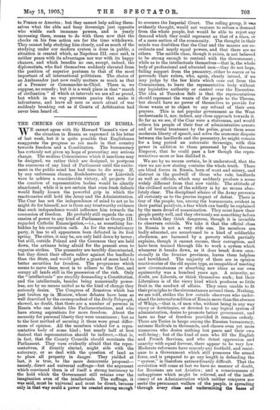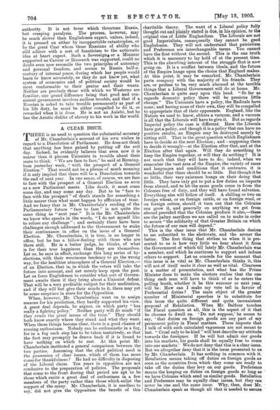liv -E cannot agree with Sir Howard Vincent's view of the
situation in Russia as expressed in his letter of last week, but it is quite possible that Englishmen exaggerate the progress as yet made in that country towards freedom and a Constitution. The bureaucracy has certainly not given up hope of preventing any serious change. The endless Commissions which it sanctions may be designed, we rather think are designed, to postpone the summons of any kind of Parliament until the excite- ment in the public mind has had time to die away. If, by any unforeseen chance, Rozhdestvensky or Linevitch were to achieve a considerable victory, all projects for the creation of representative bodies would be silently abandoned; while it is not certain that even fresh defeats would finally loosen the powerful grip in which the reactionaries still hold the Army and the Administration. The Czar has not the independence of mind to act as he might do for himself, nor is there any trustworthy evidence that such independence would influence him towards the concession of freedom. He probably still regards the con- cession of power to any kind of Parliament as George III. regarded Catholic Emancipation,—i.e., as something for- bidden by his coronation oath. As for the revolutionary party, it has to all appearance been defeated. in its first spring. The cities, it may be, are only held down by terror; but still, outside Poland and the Caucasus they are held down, the artisans being afraid for the present even to organise strikes. The peasantry are terribly discontented, but they direct their efforts rather against the landlords than the State, and would prefer a grant of more land to better securities for freedom. The programme which seems to move them most is to adhere to the Czar, and occupy all lands still in the possession of the rich. Only the " intellectuals " are steadily demanding a Constitution, and the intellectuals, besides being numerically power- less, are by no means united as to the kind, of change they seriously desire. The Congress of Zemstvos which has just broken up in Moscow, whose debates have been so well described by the correspondent of the Daily Telegraph, showed, no doubt, that there are a number of persons in Russia who can debate like Parliamentarians, and who have strong aspirations for more freedom. About the necessity for personal liberty they were unanimous ; but as to the best method of securing it there were great differ- ences of opinion. All the members wished for a repre- sentative body of some kind ; but nearly half at first desired that representation should be indirect, —that is, in fact, that the County Councils should nominate the Parliament. They were evidently afraid that the repre- sentatives, if directly elected, might side with the autocracy, or so deal with the question of land as to place all property in danger. They yielded at last, it is true, to the more democratic proposal— namely, direct and universal suffrage—but the argument which convinced them is of itself a strong testimony to the hold which the Government still retains over the imagination even of the intellectuals. The suffrage, it was said, must be universal and must be direct, because only in that way could a power be created strong enough to overawe the Imperial Court. The ruling group, it was evidently thought, would not venture to refuse a demand from the whole people, but would be able to reject any demand. which they could represent as that of a class, or of a mere section of the community. The thought in their minds was doubtless that the Czar and the masses are co- ordinate and nearly equal powers, and that there are no Others. The middle class, though it exists, is not believed• to be strong enough to contend with the Government ; while as to the intellectuals themselves—that is, the whole body of professional and educated men—they do not hope, failing support from the peasantry, either to coerce or to persuade their rulers, who, again, clearly intend, if we may judge by the few hints which ooze out from the Commissions, to leave the representative body without any legislative authority or control over the Executive. The idea at Tsarskoe Selo is that the representatives should represent the wants of the people to the Throne, but should. have no power of themselves to provide for those wants or to object to any refusal of their own prayers. This is not popular government as the West understands it, nor, indeed, any close approach towards it. So far as we see, if the Czar were a statesman, and would relieve his people of their fear of administrative arrests and of brutal treatment by the police, grant them some moderate liberty of speech, and solve the economic dispute between the landlords and the peasantry, he might remain for a long period an autocratic Sovereign, with this power in addition to those possessed by the German Emperor, that he could pass a law though the repre- sentatives more or less disliked it.
We are by no means certain, be it understood, that the view we are now stating contains the whole truth. There are blind forces in Russia, born of want and misery, and distrust in the goodwill of those who rule, landlords as well as officials, which may suddenly produce a scene widely different from that now visible. The attitude of the civilised section of the soldiery is by no means abso- lutely clear. The disciplined silence of the Army prevents all certainty as to the precise impact of defeat. There is fear of the people, too, among the bureaucrats, evident in their partial paralysis, a fear which can hardly be explained by the mere dread of assassination. They must know their people pretty well, and they obviously see something before them which they think dangerous, though it is invisible to observers outside. We take it that the official class in Russia is not a very able one. Its members are badly educated, are accustomed to a, kind of soldierlike obedience, are harassed. by a poverty which partially explains, though it cannot excuse, their corruption, and have been trained through life to work a system which whenever it breaks down, as it does break down occa- sionally in the frontier provinces, leaves them helpless and bewildered. The majority of them are in opinion reactionaries of the old squire type, as incapable of meeting new circumstances or absorbing new ideas as our own squirearchy was a hundred years ago. A minority, no doubt, are Liberals, or think themselves such ; but their Liberalism is of the viewy kind which produces so little fruit in the conduct of affairs. They seem unable to fit their principles to the circumstances around them. Nothing, we are told, strikes the few outside observers who under- stand the internal condition of Russia more than the absence of Whigs,—that is, of men who, without being in any way viewy or doctrinaire, or devoted to any logical system of administration, desire to promote better government, and have no fear of freedom provided it remains orderly. There are Tories in heaps among the Russian bureaucracy, extreme Radicals in thousands, and classes even yet more numerous who desire nothing but peace and their own well-being ; but of the kind of men who fill the English and French Services, and who detest oppression and anarchy with equal fervour, there appear to be very few. Moderate reformers have scarcely any foothold, and resist- ance to a Government which still possesses the armed force, and is prepared to go any length in defending the "system," is therefore extraordinarily difficult. That the revolution will come at last we have no manner of doubt, for Russians are not Asiatics ; and a consciousness of unhappiness which might be relieved, and of the ineffi- ciency of an Administration which neither conquers nor seeks the permanent welfare of the people, is spreading through every clan and undermining the of authority. It is not fever which threatens Russia, but creeping paralysis. The process, however, may be much slower than Englishmen expect, unless, indeed, it is pressed on either by insupportable catastrophes, or by the great Czar whom those Russians of abihty who still adhere with a sort of fanaticism to the autocratic idea at heart expect. Such a Sovereign or a Minister supported as Cavour or Bismarck was supported, could no doubt even now reconcile the two principles of autocracy and personal freedom, and secure to Russia half-a- century of internal peace, during which her people would learn to know accurately, as they do not know yet, what system of economics and of political society would be most conformable to their genius and their wants. Neither are precisely those with which we Westerns are familiar, one grand difference being that good and con- sistent government involves endless trouble, and that if a Russian is asked to take trouble permanently as part of his life duty, he must be either compelled to do it, or rewarded when it is done. He is not an Asiatic, but he has the Asiatic dislike of slavery to his work in the world.







































 Previous page
Previous page